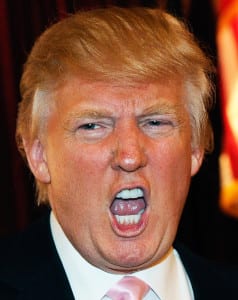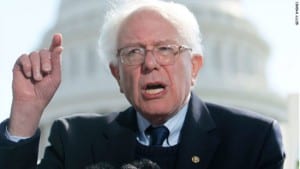By Curtis Seltzer –
BLUE GRASS, Va. — Six months ago, I wrote that Donald Trump and Bernie Sanders would be the nominees for president in 2016. Those predictions seemed far-fetched at the time. Now, Trump seems nearfetched, and Sanders is running a stubborn second to Hillary Clinton.

Chairman and President of the Trump Organization Donald Trump yells ‘you’re fired’ : David Becker/Getty Images
Both Trump and Sanders have gotten stronger by staying authentic to themselves.
Trump has succeeded in riding feelings of unease that cross both party lines and classes. He targets constituencies with a grievance. He offers one-sentence solutions to every problem.
He’s made his greatest weakness — that he is a superficial, unprincipled political novice whose only “qualifications†for high office are his nonsensical celebrity and success in building garish hotels and casinos — into his greatest strength. He brags about his piracy. He says Americans should vote for him because he is rich.
Knowing that he knew little about either domestic or foreign policy, Trump doubled down by monopolizing the space where he’s only expected to utter mind-jangling opinions and launch personal attacks. He goes this way, because then the race is about him, which is where he likes it.
He found success by never going more than an inch deep. I’ll build a wall between the U.S. and Mexico, he said. The Mexicans will pay for it — news to them, of course. How high, wide, deep and long? What kind of wall? How much will it cost to build, maintain and staff? What about a wall with Canada? Details, details, who has time for details?
I’m against open borders and illegal immigration. More walls may be needed, but a far cheaper alternative would be a national employment card based on citizenship and legal residency along with a better visa system for seasonal and temporary workers. Employment would depend on having a valid card. I’m waiting for someone to ask Trump to prove that a border wall is the most cost-effective solution to illegal immigration.

Vermont Senator Bernie Sanders running for president
Trump has concocted a campaign where discussion of his provocations is substituted for any discussion of his policies.
He seems to be running for Bully in Chief. Why he thinks name-calling, teasing and insults will work with leaders of sovereign countries is beyond me.
He’s shown that he has a bully’s knack for homing in on a target’s vulnerability. Jeb Bush—“low energy,†who would quarrel with that? Carly Fiorina’s face—well, it speaks for itself as unfair as that is. Bill Clinton’s philandering—no one can deny that he has walked his dog on many streets. And did his wife not adjust to his decades-long, sexist escapades?
What’s next? Will Trump announce that Chris Christie is tubbier than Fatso Fogarty? Will he say that no one should support Ted Cruz because he looks like Grandpa on “The Munsters�
Name-calling and personal attacks — the more personal the more effective — have often worked in American elections.
Trump’s twist is to mobilize these antics into a diversion to hide his total inexperience in political administration (working with a legislature, developing policies, managing civil servants), foreign policy, defense policy, homeland security, tax policy, health-care policy, law enforcement, environmental policy, veterans affairs, agricultural policy and fiscal policy, among others. Many others.
Trump is neither a political conservative nor a liberal. He’s not driven by ideology or religion. He’s simply a guy who has figured out a plausible tactic to hornswoggle Republicans into nominating him for president.
To make the most of what he has (and hasn’t), he says and does whatever he needs to say and do at the moment. He doesn’t care about being consistent or inconsistent. He just wants to get the deal done.
Whatever.
And so he is friends with the Clintons when that advantages his pocketbook, and then he’s not when his self-interest conflicts with theirs. Who would want to share a foxhole with someone like that? Even another fox wouldn’t get in.
Some Democrats might see an upside in Trump. For example, it’s arguable that the country would have a better chance of getting a single-payer, health-care system — like universal Medicare — with Trump in office than with either Sanders or Clinton. (My guess is that universal health care will arrive eventually for reasons of cost control and net benefit. And I’m sure it will have some of the same negative side effects found in existing systems.)
Trump would see universal health care as a cost removed from a businessman’s account and shifted to all taxpayers. He’d see it as a deal to be struck. Sanders would push it as an ideological good, a citizen’s right that should be provided at the lowest possible cost. Trump’s approach might work; Sanders’, not likely during his term.
Clinton would tinker with Obamacare, despite my opinion that she prefers a single-payer system. She doesn’t have the stomach for a single-payer fight.
I also think that Trump is more likely than Clinton to stay out of Syria, Iraq, Libya and Yemen. He would apply a simple cost-benefit analysis that would show that the long-term price of trying to fix the unfixable is not worth the short-term mixed results which are the best that can be anticipated. He — and Sanders, too — would contain and erode ISIS rather than slug it out with a tar baby.
Hillary, on the other hand, is likely to feel that she has to show how “tough†she is by sending U.S. troops into complicated religious/ethnic conflicts that won’t be remedied by our good-faith efforts.
Fear of being labelled “soft on communism†is what brought Lyndon Johnson to his knees. Surely, we can expect a president to have enough courage to resist purchasing political cover with the lives of American soldiers. With Hillary, I have doubts.
Bernie Sanders has not grown as a candidate in my opinion, despite increasing support.
He restates the same handful of “important†issues in the same format and in the same words. He’s worked most of these issues for decades, which says a lot about both the issues and his consistency.
The big change in his rhetoric has been the substitution of “billionaires†as the 2016 class enemy for “millionaires†in the last century. He said this week: “I have been fairly consistent my entire political life. Some people say I’m kind of boring because I have been saying the same thing for 30 years.†Fifty years is more accurate.
Too often, he comes across as an always-angry scold. He has a nice smile, but is as stingy with it as Scrooge is in giving away a dime.
Where Trump mugs and pouts, Sanders frowns and exhorts. He talks with his hands—waving and pointing, chopping like an earnest television chef hawking Ginsu knives.
All presidents wear thin after a while, but I think Bernie would get there faster than most. He’s yet to learn that not every issue requires full-bore passion. Still, that’s who he is.
As much as Trump avoids thinking deeply about things he talks about, Sanders dwells on knowing issues and their details. What hotels are to Trump, positions are to Sanders—valuables to be kept and tended in a protected portfolio.
With Sanders, you get his best thought-out shot whether you agree with it or not. With Trump, you get seemingly impromptu slurs that I suspect are never improvised.
Both Trump and Sanders talk about income inequality. They come to that discussion from opposite directions.
Sanders’ father, Eli, immigrated in 1921 from Slopnice (swap knee se, not slop nice), a small rural town in southern Poland and worked as a paint salesman. His homemaker mother, Dorothy, was born in America of immigrant parents. They lived in a modest, three-and-a-half room, rent-controlled apartment at East 26th and Kings Highway in Brooklyn. His mother died when Sanders was a freshman at Brooklyn College.
Sanders’ fixation on economic inequality — or billionaire bashing, if you prefer — comes from his own experience. He’s said: “It’s not that we were poor, but [there was always] the constant pressure of never having enough money. …the money question to me has always been very deep and emotional.â€
In his view, people are poor and oppressed because someone and some system is sticking it to them.
Post-Holocaust, Jewish Brooklyn in the 40s and 50s nurtured a mixture of attitudes: resentment against unfair, burdensome Authority (Hitler, Stalin); a sense of outsiderness coupled with a strong urge to assimilate; a belief that education was the way out of economic misery; and support for government programs, like the New Deal, that helped people like them.
Sanders political vulnerability is that he’s left-of-center, New Yorky in speech, manner and beliefs. Most of the country is not. Even most of the Democratic primary is not. Trump, as native a New Yorker as Sanders, is New Yorky in different respects. Hillary is not New Yorky in any respect.
Between the two Democrats, Bernie strikes me as priggishly honest about money; Hillary strikes me as opportunistically and chronically dishonest.
Bernie has a reported net worth of maybe $700,000; Hillary, $45 million; Donald, $4.5 billion. The two poorest candidates are O’Malley at zero, and Rubio at $100,000. The others are millionaires.
Trump strikes me as a rich kid who’s gotten richer by buying what he wants, ignoring rules when he can and squeezing advantage from people and situations when he could. He was born into development-based affluence and has added to his inheritance, but his business dealings are suspect.
Sanders is not fundamentally evasive; Clinton is. He doesn’t make things up when it suits him; she does. Trump evades by ignoring inconvenient facts and framing accusations as innocent questions.
On the other hand, Hillary has much more relevant experience than either of the guys. She’s dealt with foreign and defense complexities; neither Trump nor Sanders has.
Situations in the Middle East and Afghanistan worsened during her four years at State, but I don’t think she should be blamed for trends that were largely not subject to American manipulation.
There’s no substitute for the one-of-a-kind experience of deciding the fate of this country. John Kennedy was a more competent and less reckless president in such matters after the Bay of Pigs and the Cuban missile crisis. On that type of experience, Hillary bests everyone.
Her executive experience, however, is limited to being secretary of state and running political campaigns—a mixed record.
Trump’s only political experience is that of manipulating politicians through donations to get what he wants. He has zero experience in political leadership in which you have to work with opponents, not simply buy them.
The Presidency is a broader and different job from that of running a private LLC like the Trump Organization. A CEO can summarily fire employees and escape failures through bankruptcy. A president cannot fire a political opponent or duck his own bungles.
Sanders’ only executive experience is that of a four-term mayor of Burlington, Vermont, in the 1980s. It was then a city of fewer than 40,000, primarily working-class Irish and French Catholics.
His theme in his first race in 1980 was to take power from the millionaires who ran the City through the incumbent mayor and give it to working people. He won by 10 votes. He became ever more popular in office. He won election to the U.S. Senate in 2012 with 71 percent of the vote.
By all accounts, he was an honest and effective mayor. He was interested in the nitty-gritty of providing services and affordable housing as well as the larger issues of appropriate development and environmental protection.
He balanced the City’s budgets as you might expect of a kid who was raised in a house where balance was the key to survival. He raised property taxes modestly and tried to boost City revenue by ending the tax exemption of a local hospital and university.
What kind of democratic socialist policies did he follow? He supported police, veterans, artists, women, minorities, workers, taxpayers and youth. He opposed Trump-like developments in favor of projects that reserved places for working families and maintained open space and public access. He promoted small businesses and cooperatives. He worked well with the City’s leading developer, Tony Pomerleau, and promoted green energy.
But paddling a canoe in Lake Champlain is not the same as captaining a 1,500-foot-long tanker across an ocean. Sanders is as inexperienced in running anything remotely comparable to the federal government as Barack Obama, Bob Dole, John Kerry, Newt Gingrich, Joe Biden and John McCain.
Sanders is not the most liberal Senator judged by spending votes, according to the conservative Cato Institute. He’s not proposing nationalization of basic industries. He’s not against capitalism as much as he’s in favor of fair wages, equal treatment and responsible corporate decisions. He likes entrepreneurs, small business, cooperatives and employee-owned enterprises.
He would try to federalize health care for all. My guess is that he would allow private insurance to supplement basic public services.
Given a choice, I’d prefer a new president with executive experience, a couple of Senate terms and a recent foreign-policy role. This fits Hillary alone.
My problem is that I don’t trust her instincts, her integrity and her husband. My money bets that Bill will sabotage her campaign—maybe unconsciously, maybe by way of his history.
No active candidate has military service, either as a conscript or volunteer.
I don’t think that being in the service qualifies a person to decide American military strategies or make global decisions regarding interventions, regime-change and nation-building. But I know others believe otherwise.
I’m more concerned that none of the candidates seems to have studied military policy and foreign affairs either as a student or subsequently. Hillary learned what she knows about the affairs of state on the job, for which she had no training and limited background.
Can a president function competently as commander in chief having never served in the military? Can someone who either bypassed service or wiggled out of it make these decisions and credibly lead our armed forces?
Washington and Eisenhower represent presidents with extensive executive military experience. They did pretty well.
Trump and Sanders came up in a different age.
Trump received student deferments (2-S) in the mid-1960s, a 1-Y for almost three years and a 4-F in 1972. In the lottery, he lucked out with 356, a guarantee that he would not be drafted.
Trump was deemed a 1-Y on October 15, 1968 after being reclassified 1-A—the category most likely to be drafted. This occurred a few months after he graduated from the University of Pennsylvania. (Trump, like Obama, has not released his transcripts.)
A 1-Y meant: “Registrant available for military service, but qualified for military only in the event of war or national emergency.†The Vietnam War — as dumb as this sounds today — was not an official war. Trump has not explained why he was given 1-Y status — a virtual pass — that protected him for the next three years.
On February 1, 1972, he received a 4-F, a designation that found him “not acceptable for military service…under the established physical, mental, or moral standards.†At the time, Trump played baseball, squash and tennis.†The 4-F was bestowed for heel spurs that Trump has subsequently described as “minor.â€
Sanders was eligible for the draft between 1959 and 1967 when he turned 26. He received student deferments during his college years. He applied for conscientious-objector status as a pacifist opposed to all wars. He married after college, which saved him from conscription until his divorce in 1966. His draft exposure would end in September, 1967. By the time his draft board turned down his CO application, Sanders had turned 26 and was no longer eligible. He says that he is no longer a pacifist.
Hillary Clinton was not eligible for the draft and did not volunteer.
Both Trump and Sanders opposed the War, as did I. Both gamed the draft to get out of it, as did I. I wasn’t a pacifist and did not apply for that status.
In August, 1968, when I took my physical, the Selective Service was not much interested in drafting anti-War malcontents. I’ve thought for a long time that my allergy-asthma letter was not the reason I was not drafted. The allergy part was true; allergies were the reason why my Dad was discharged from his tank-destroyer unit in 1944. I, too, had a bunch as a kid. But “my†asthma was theoretical and latent, a sort of inferred condition; in reality, a lie.
The acceptance of my letter — written by an anti-War doctor who had treated my allergies — was too easy. There was no review or examination. No doctor asked me anything.
It felt like they had my name on an “avoid-this-clown†list. I’m sure I was on other lists at the time.
Trump, Sanders and Clinton — all of whom came through this experience — share a suspicion of putting U.S. troops in chaotic conflicts of marginal importance to our national interest. It’s not that they think ISIS is good in any sense of the word. It’s that they don’t see a military occupation as the way to stop religious battles in that part of the world.
No current candidate has worn an American military uniform. They join a group that includes John Adams, Jefferson, John Quincy Adams, Cleveland, Taft, Wilson, Harding, Coolidge, Hoover, FDR, Clinton and Obama. Lincoln served for several months as a private in the Illinois militia without fighting anything more dangerous that blood-thirsty insects. Cleveland paid $150 to hire a substitute during the Civil War.
The lack of military experience did not hinder Jefferson, Wilson and FDR during wars. The military service of Johnson, Nixon and Reagan seemingly did nothing to make them wiser commanders-in-chief.
From this record, no firm-and-fast conclusion jumps out. Military service can obviously help a president, but decisions about when, where and how to use military force in concert with other means can be competently made by those without it.
A month before the Iowa caucuses, I’m sticking with Trump as the Republican nominee.
Sanders trails Clinton by 17 points, but Bill Clinton could easily collapse that margin of victory in one swell swoop.
The conventional money is on Hillary. But Bernie is respectable in Iowa and strong in New Hampshire. He is weak in the South, but competitive on the Coasts and across the North and upper Midwest.
It’s entirely possible that Sanders will get more delegates than Clinton just as Obama did.
A Sanders-Trump election—the fur would fly.
Curtis Seltzer is a land consultant, columnist and author of How To Be a DIRT-SMART Buyer of Country Property, available at curtis-seltzer.com where his columns are posted and his other books — Spinal Chords From The Devil’s Backbone, Maple-leaf Rags, Snowy Mountain Breakdown, Blue Grass Notes and Land Matters — can be ordered.













